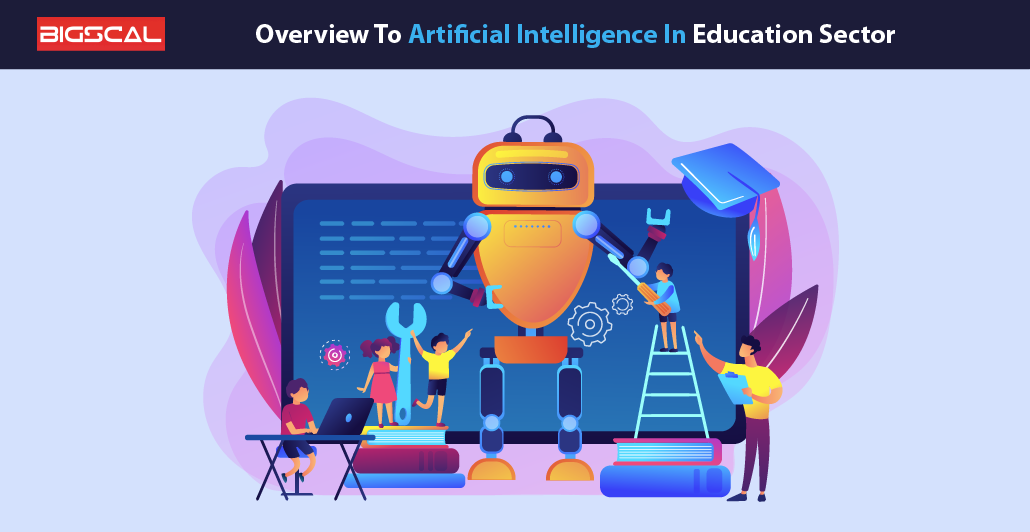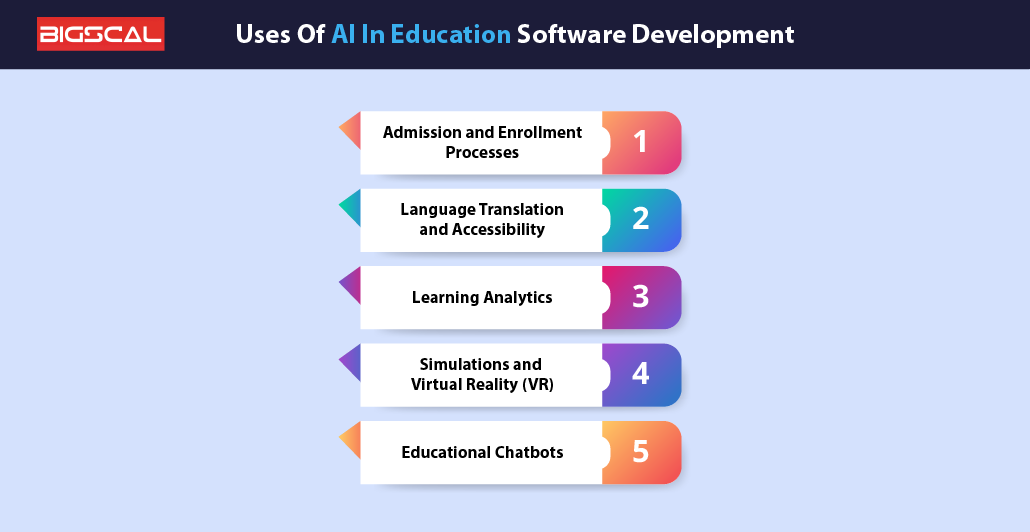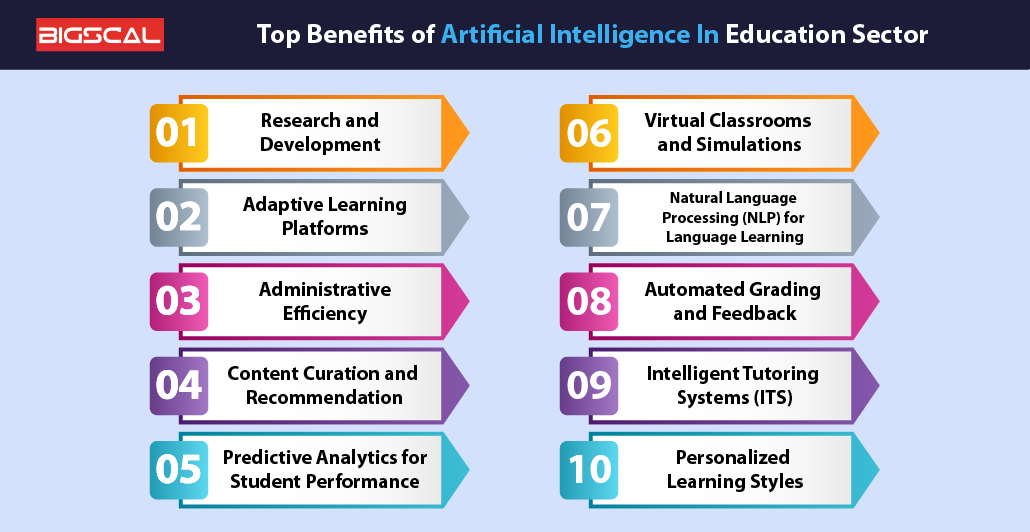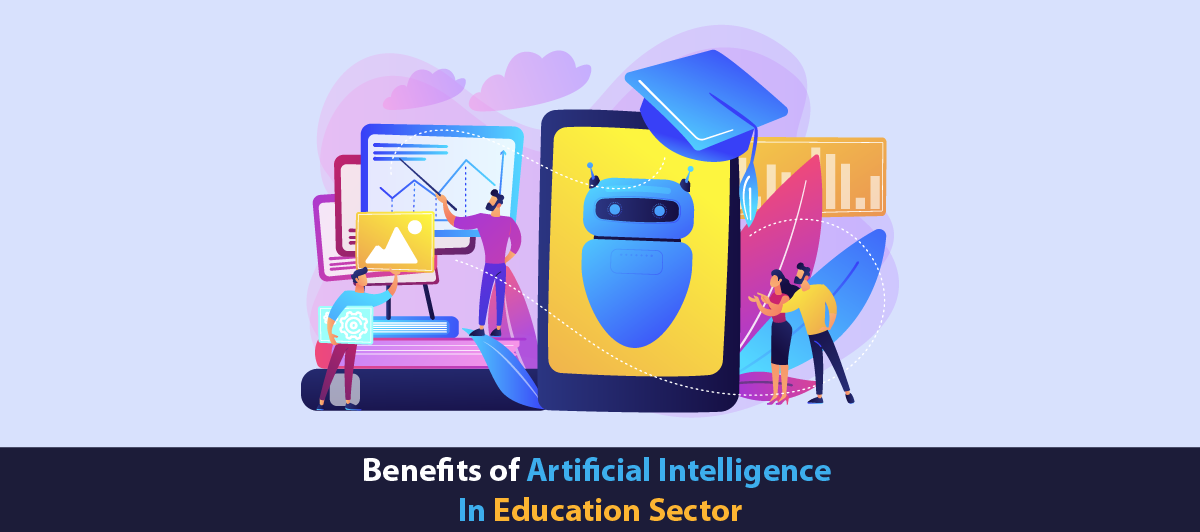Top Benefits of Artificial Intelligence In Education Sector
Quick Summary: Artificial intelligence (AI) brings many benefits to education, enhancing the learning experience and outcomes. It customizes learning by adapting to the needs of individual students, automates administrative tasks, and improves accessibility. It provides data-driven insights for educators to make informed decisions, and foster innovation in instructional strategies education technology and curriculum development. Read this article to read about the Benefits of Artificial Intelligence In Education!
Introduction
Artificial intelligence (AI) is transforming every industry it touches, and education is no exception. There are various Benefits of Artificial Intelligence In Education .
The integration of AI technology into the education system has opened up a world of possibilities. It transforms traditional teaching and learning methods. From personalized learning experiences to more efficient administrative services, AI enhances every aspect of education.
But in what aspects? Read it to know this!
A key advantage of AI in education is individualized learning. Which offers a model that is tailored to each student’s learning requirements and style. The AI robots’ algorithms use the analysis of learners’ intellectual paths. Also include strong points, and shortcomings to personalize instruction and pace learning level-wise to an individual. This helps in enabling the involvement of students in their respective learning and understanding processes. Which consequently facilitates good academic outcomes.
AI frees up human employees through automation of administrative processes. It provides this advantage of course instructors being able to narrow the teaching materials. Response of the human beings focused on functions like activity grading, program management. It also includes attendance monitoring among others can be done efficiently by the AI systems. Automation in education can potentially lower the time and the financial expenses of educational institutions, as it is a facility that does not require any human interaction.
Another important benefit is the availability of AI-powered, virtual learning assistants for tutors and assistants. This system provides immediate feedback, answers questions, and provides support around the clock. It enhances the learning experience beyond classroom hours.
There are more interesting benefits of integrating AI into education software development services.
So, keep reading!
Overview To Artificial Intelligence In Education Sector

Artificial intelligence (AI) is the recent wave of education technological advancements which come with those innovations. These venues make students able to get up close to their favorite actors, dancers, or musicians. Education software development companies can undertake this project through the software development process.
The most striking application of AI is personalized learning in which algorithms can measure the students’ strong and weak points. With that their study habits and learning styles and that by adjusting learning content accordingly they will be guided accordingly. It is based on the concept of real que learning, where students can learn and study effectively. This learning method is of adaptive nature.
Besides, chat bots and other AI technologies are leading to changes in the role of student support. They present the students with constant support, they reply to their questions and provide feedback, and they explain concepts to them and assign tasks. It also lessens the teachers’ effort in the class and facilitates students to improve their knowledge in out-of-class activities.
In addition to this, the algorithms of the AI are used to analyze the big data of the educational area in order to find patterns and tendencies. It gives an opportunity for the organizations to take the decisions on the basis of the data. Predictive analytics has the ability to figure out which students are at a very high risk academically earlier than others. Thus, this makes for an adequate time to successful actions aimed at overcoming learning difficulties. And also play an imperative role in providing early childhood education.
Uses Of AI In Education Software Development
Before reading about the Benefits of Artificial Intelligence In Education let’s know AI can use in education industry:

- Admission and Enrollment Processes: AI can be utilized in the direction of admission and enrollment processes by means of the substitution of computerized operations. The main services are screening of documents, verification of the utilities, and matching standards set by the admission agencies.
- Language Translation and Accessibility: AI made tools which are language translation-friendly. The service provides an opportunity for students to get acquainted with educational material even in language that is not their native one. In addition, AI can contribute to the creation of ICT tools for students with disabilities. Which include sign language recognition technology. This may involve failure recognition and text-to-sound, even sound reputation technologies.
- Learning Analytics: Intelligence can get understanding of mathematics by AI. To name a few, what method should be applied, how learners are to engage with teaching materials. And where remediations are necessary within the subject curriculum also come out. Sorted with these data, teachers can make informed decisions and construct their abilities.
- Simulations and Virtual Reality (VR): AI can linger into the training story line, using simulations and VR scenes or others. It enables a learning process in a way whereby a student experiment with difficult concepts in an engaging environment that is safe and easy to learn.
- Educational Chatbots: AI-assisted bots, needless to say, can, in real-time be the medium for getting connected with college students, respond to questions, distribute knowledge, and help them in exploring academic pathways. In learning management system or instructional programs, chatbots can be an effective tool.
Top Benefits of Artificial Intelligence In Education Sector
Here are some Benefits of AI in education sector, have a look:

Research and Development
AI (artificial intelligence) is in a way evolving the education sector among other things, through its research and development side. An AI ability to process big data in one go by learning from experience. With that, making accurate decisions is the most significant benefit here. One of the strongest capabilities of such systems is the ability to obtain useful information regarding student learning, practice, and professional choices.
Spurred by AI analytics tools, data-driven decisions in business are powered by the facts, it follows the data analysis as it happens. Researchers who apply AI algorithms. It can detect patterns of interaction, trends or other phenomena that from visual inspection would remain unnoticeable. Thus, it enables the formation of instruction programs and preventive approaches, which are based on the research outcomes. And targeted on the specific issues of particular students.
Besides fostering a collaborative community of students, classroom teachers, researchers and institutions at large via AI-powered research forums. The knowledge sharing and research process also becomes enhanced thus. These forums come into existence as an online research ecosystem where most members can share their ideas, seek information, and learn more together.
Adaptive Learning Platforms
AI-driven adaptive learning platforms make students’ engagement with educational content and way of learning to be unique based on very specific learning styles, capabilities and achievements. These platforms consume machine learning, hence they are aimed at personalizing learning experience for each student in individual fashion and do this dynamically, i.e., adjustments are made on the go.
One of the remarkable benefits of flexible curriculum entailing it is a capacity to create personalized suggestions and interventions that go for specific learning disabilities or troubles that students might have. In fact, this are a customized approach goes not only for effective achievement of outcomes, but also it is the major driving force for student motivation and engagement, for them to attend classes together.
Telemachus is the indirect recipient of Calypso’s instructions on how to live a wise, justified life. It is a result of a constant feedback loop through which the faculty gains knowledge of what should be changed; monitors students’ progress, and makes on-the-fly alterations in the teaching strategies used.
Furthermore, flexible learning styles encourage self-directed learning by empowering students to take control of their own school and learning journey. By providing customized learning strategies and interactive content, these workshops create a more student-centered and convenient learning environment.
Administrative Efficiency
Artificial intelligence (AI) is playing an important role in improving productivity in higher education institutions. One key benefit is the automation of routine administrative tasks such as student registration, scheduling, and grading. A.I.
AI algorithms can analyze large amounts of data to gain valuable insights for decision making. For example, predictive analytics can predict student enrollment. They can help organizations allocate resources more efficiently. Additionally, AI-powered chatbots can handle questions from students, parents and staff. It provides instant feedback and freeing up administrative staff for more complex tasks.
Additionally, AI-powered systems can identify anomalies in student behavior or potential cybersecurity risks. It protects critical data and enables security measures to ensure a safe learning environment has been improved. Overall, the benefits of AI in improving efficiency enable educational institutions to be more efficient, focusing on strategic development.
Content Curation and Recommendation
AI’s impact on content curation and recommendations is revolutionary in education. With the amount of educational content available. AI algorithms can tailor the learning experience to students based on their preferences, learning styles and performance considerations.
Through data analytics and machine learning, AI systems can tailor relevant instructional content. Such as articles, videos and quizzes, to each student’s needs. This personalization enhances engagement. It drives learning outcomes effectively by providing targeted content that matches individual students.
In addition, AI algorithms can monitor and analyze students’ interactions with learning materials, providing valuable insights for teachers to refine learning strategies and enhance lesson plans. Finally, AI-driven content curation and recommendation systems empower teachers to deliver more effective and personalized learning experiences. Thereby improving student outcomes.
Predictive Analytics for Student Performance
Artificial and artificial intelligence systems (AI) have revolutionized education by introducing predictive analytics. It is a powerful tool for analyzing large amounts of data to predict student performance improvements. Using AI algorithms, educators can identify patterns and trends in students in study behavior, attendance, engagement, and academic achievement.
A key advantage of predictive analytics is its ability to provide early intervention strategies. The AI system can flag at-risk students based on historical data. It allows teachers to intervene faster and provide personalized help. This approach helps address barriers to learning and increases student retention rates.
Additionally, predictive analytics helps in curriculum design and instructional strategies. Educators can use insights from AI-driven data analytics to tailor their teaching strategies to meet students’ individual needs, thereby improving learning outcomes. By applying AI to predictive analytics, educational institutions and corporate training organizations can make data-driven decisions. It increases overall student success and organizational effectiveness.
Virtual Classrooms and Simulations
Virtual classrooms and simulations powered by AI technology have become an integral part of modern education. These tools transcend the boundaries of the traditional classroom to provide an immersive learning experience. AI-powered virtual classrooms allow students to participate in interactive lectures, collaborate with peers in real time and access educational materials from anywhere in the world.
Simulation, on the other hand, provides a safe and supervised environment for students to apply theoretical skills in practical situations. AI algorithms enhance simulations by creating dynamic and variable environments that challenge students’ critical thinking and problem-solving skills.
In addition, virtual classrooms and simulations encourage integration by adapting to different learning styles and preferences. Students can learn at their own pace, receive immediate feedback, and engage in hands-on activities that enhance active learning. By leveraging AI in virtual classrooms and simulations, educational institutions can deliver high-quality. This will create a interactive learning experiences that prepare students for success in the digital age.
Natural Language Processing (NLP) for Language Learning
Natural Language Processing (NLP) is a branch of AI that enables machines to understand, interpret and produce human language. In education, NLP plays an important role in language learning by providing personalized and customized learning experiences.
AI-powered language learning methods equipped with NLP capabilities can analyze learners’ skill levels, curriculum, and preferences to tailor learning content accordingly. This format provides students with content that is appropriate for their skill level. It also makes the learning process more efficient and enjoyable.
Furthermore, NLP-powered language learning tools can provide immediate feedback on grammar, pronunciation, and vocabulary. It helps students improve their language skills in a structured way. These tools can include interactive exercises, quizzes, and games to reinforce learning and increase retention.
Automated Grading and Feedback
Artificial intelligence AI tutor in education streamlines the grading process by automating tasks. Such tasks are as multiple-choice assessments, quizzes, and assignments. This technology uses algorithms to analyze student responses and provide immediate feedback. By doing so, teachers can save valuable time and focus more on creating engaging learning experiences.
Automated grading ensures the accuracy and precision of evaluations, as the AI system follows preset criteria without bias. Additionally, it allows teachers to closely monitor student progress, and identify areas where students may need additional support or resources.
Furthermore, AI-driven feedback is often personalized. With that it provides specific insights into students’ strengths and weaknesses. This allows teachers to tailor their teaching strategies and interventions accordingly, creating a conducive and effective learning environment.
Intelligent Tutoring Systems (ITS)
Intelligent tutoring systems (ITS) use AI algorithms to deliver a personalized learning experience. This framework analyzes student data, such as performance metrics and course preferences, to develop customized learning strategies.
ITS can simulate one-on-one instructional experiences by adapting content and pace based on individual student needs. Using natural language processing (NLP) and machine learning techniques. This system is able to understand student input and provide contextual instruction.
One of the key advantages of ITS is that it provides immediate feedback and correction, increases student engagement and retention. It also allows teachers to monitor student progress in real time. Intervening when necessary to ensure concepts are understood and mastered effectively.
Personalized Learning Styles
AI is playing a key role in creating personalized learning experiences tailored to each student’s unique abilities, interests and learning styles. By analyzing large amounts of data, AI algorithms can create personalized learning strategies.
Individualized learning develops student autonomy and motivation by providing appropriate and challenging feedback. This allows students to learn at their own pace, fill in knowledge gaps, and improve in areas of strength.
In addition, individual users of Generative AI tools promote inclusion by addressing diverse learning needs. It also provides targeted support for students with learning disabilities or special needs. This approach provides overall learning outcomes and student satisfaction improves. With that it stimulates the teaching and learning process.
Take Bigscal Technologies Help To Build AI Tools For Your Educational Business
After reading various impeccable Benefits of Artificial Intelligence In Education you might want to integrate AI into your education software.
So, if you are seeking an Artificial Intelligence Development Company. Then don’t seek further as we are here. At Bigscal, we build customized AI solutions for your education business, weaving innovation into every aspect. Our AI wizards capture personalized learning experiences, making education more engaging and effective. Imagine students delving into interactive diagrams or retrieving targeted data, all driven by AI insights. With Bigscal by your side, you will see your educational career flourish, as we infuse it with artificial intelligence.
Conclusion
There are countless Benefits of Artificial Intelligence In Education. It transforms teaching and learning processes. It facilitates effective administrative tasks, and allows teachers to focus more on effective teaching strategies. AI-powered tools such as chatbots and virtual tutors provide ongoing support and immediate feedback, creating a conducive learning environment. Additionally, AI-powered data analytics enable institutions to make informed decisions, optimize resources, and improve education overall. The adoption of AI in education not only prepares students for a technology-driven future but also empowers educators to deliver more personalized, effective and convenient learning experiences.
FAQ
What is early childhood education?
Early childhood education refers to educational programs and strategies designed for children from birth to about age eight, with a focus on cognitive, social, emotional and physical development through play-based learning.
What is visual or hearing impairments?
Visual impairments refer to conditions that affect sight, ranging from partial sight to total blindness, while hearing impairments involve difficulties in hearing, varying from mild to profound hearing loss.
What is the Meaning of artificial intelligence use in education?
Artificial intelligence in education refers to the application of AI technologies like machine learning and natural language processing. It enhances learning experiences, personalizes content, provides feedback, and streamline administrative tasks.
What kind of AI do students use?
Students use various types of AI in education, including intelligent tutoring systems, virtual learning assistants, personalized learning platforms, automated grading systems. And educational games incorporating AI algorithms for adaptive learning experiences.
What are three real examples of artificial intelligence?
- Voice assistants: such as Amazon Alexa, Apple Siri, and Google Assistant, which use natural language processing and machine learning to understand and respond to user commands.
- Self-Driving Cars: Companies like Tesla, Waymo and Uber are developing autonomous vehicles that can use AI algorithms to perceive their surroundings. Make decisions and navigate safely without human intervention.
- Recommendation systems: Platforms like Netflix, Amazon, and Spotify use AI to analyze user preferences and behaviors.







